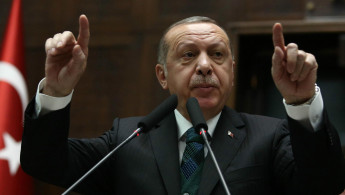Turkish opposition scrambles to unite against Erdogan
Erdogan last week rocked the world of Turkish politics when he said there would be parliamentary and presidential polls on June 24, 2018, more than a year before the expected date of Nov 3, 2019.
For the opposition, which was initially stumped by the announcement, these elections are the last chance to stop what they describe as Erdogan's authoritarianism.
Following an intense referendum campaign in April 2017, Turks approved by a narrow margin changing Turkey's parliamentary system into an executive presidency giving the head of state expanded powers.
The government insists the changes will ensure political stability, but opponents say it will lead to one-man rule.
Less than a week after the early polls announcement, opposition parties began intense talks to figure out a strategy to stop Erdogan.
In a surprise move of solidarity, the main opposition Republican People's Party (CHP) helped the newest right-wing Iyi ("Good") Party at the weekend, boosting its numbers to form a parliamentary group and thereby allowed to run in the polls.
"What we have done is a contribution to democracy, not just the Good Party," CHP chief Kemal Kilicdaroglu said after the two parties' met again on Wednesday.
 |
Less than a week after the early polls announcement, opposition parties began intense talks to figure out a strategy to stop Erdogan. |  |
With the opposition targeting Erdogan, rumours are rife over who could run against him.
There has been fevered speculation that former president and co-founder of the ruling Justice and Development Party (AKP) Abdullah Gul might become a unity candidate — though he has made no public comment on the rumours.
'Only right-wing challenge'
Already in the presidential race is the former interior minister and nationalist Meral Aksener who leads the Good Party.
"Aksener is the only right-wing challenge to Erdogan ... She has the ability to take a lot of his voters away," Soner Cagaptay, director of the Turkish Research Program at The Washington Institute for Near East Policy, said.
"She's a nationalist, she's a conservative, a practising Muslim," Cagaptay said.
According to Berk Esen, assistant professor at the department of international relations at Bilkent University in Ankara, Aksener has begun to appeal to traditional Kurdish groups as well as nationalist CHP voters.
But Cagaptay added that her biggest challenge would be trying to convince Kurdish nationalists that she can be their president as well.
Aksener has held two meetings with CHP chief Kilicdaroglu as well as with the conservative Saadet "Felicity" Party leader Temel Karamollaoglu.
Erdogan on Tuesday dismissed the opposition talks as an attempt to form "an anti-Erdogan alliance with behind-the-scenes bargaining".
 |
Erdogan on Tuesday dismissed the opposition talks as an attempt to form "an anti-Erdogan alliance with behind-the-scenes bargaining". |  |
'Well-founded' Gul rumours
Esen said Gul rumours were "well-founded" as the Saadet Party has been "pushing" for his candidacy, adding that there was also some support from the CHP leadership.
However, CHP officials have privately speculated about how popular Gul would be among their supporters because of his unwavering support for Erdogan in previous years.
"Both the leftist and nationalist factions of the CHP are heavily opposed to Gul," Esen said, adding: "As for my personal view, I do not think that Gul can energise the opposition voters given his complacent attitude while he was president".
Some prominent CHP members have clearly come out against Gul.
"Enough ... We're sick to death of this. The whole purpose is to create a debate inside the party and lower our morale. There has been no Gul on CHP's agenda, now there isn't and there won't be," CHP parliamentary group chairman Ozgür Ozel said on Wednesday.
There is also scepticism over whether Gul will run since he has never before dared to challenge Erdogan.
Kurds left out
While the Gul rumours persist, one party appears to have been left out of opposition talks: the pro-Kurdish Peoples' Democratic Party (HDP).
When Erdogan was first elected as president in August 2014, then HDP co-chief Selahattin Demirtas ran against him winning nearly 10% of the vote.
But in November 2016, the charismatic Demirtas was imprisoned over alleged links to Kurdish militants, which he denies.
The HDP says his detention is due to his strong opposition to the new system.
Despite the difficulties, co-chair Sezai Temelli told the Hurriyet daily this week that Demirtas was among its potential candidates.
Meanwhile, opposition parties continue their talks, and Cagaptay cautioned that there was still time left for a lot to change.
"Two months in Turkey is two centuries in any other political system," he added





 Follow the Middle East's top stories in English at The New Arab on Google News
Follow the Middle East's top stories in English at The New Arab on Google News


![22 Arab countries at COP29 have rejected the targeting of fossil fuels [Getty]](/sites/default/files/styles/image_330x185/public/2024-11/GettyImages-2184289638.jpg?h=199d8c1f&itok=ptHl5bec)